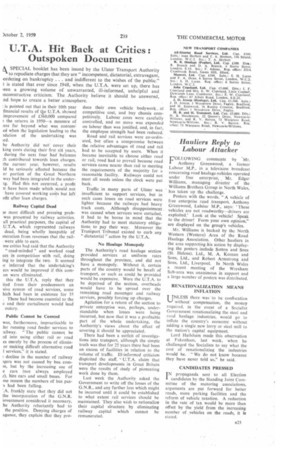U.T.A. Hit Back at Critics : Outspoken Document
Page 57

If you've noticed an error in this article please click here to report it so we can fix it.
& SPECIAL booklet has been issued by the Ulster Transport Authority —1 to repudiate charges that they are " incompetent, dictatorial, extravagant, ordering on bankruptcy .. . and indifferent to the wishes of the public." t is stated that ever Since r948, when the U.T.A. were set up, there has ecti a growing volume of unwarranted, ill-informed, unhelpful and tnconstructive criticism. The Authority believe it should be answered, nd hope to create a better atmosphere.
: is pointed out that in their 10th year financial results of tile U.T.A. showed improvement of 060,000 compared
the returns in 1950—a measure of :ess far beyond what was comm.ed when the legislation leading to the idation of the undertaking was ;ed.
he Authority did net' cover their king costs during their first sift years, during the next four had balances :.11 contributed towards loan charges. the current year, however, results Id be seriously affected because the er portion of the Great Northern way had been integrated in the underag. Had this not occurred, a profit it have been made which would not have covered working cots but left ofit after loan charges.
Railway Capital Dead
te most difficult and pressing probwas presented by railway activities. all practical purposes, the capital of U.T.A. which represented railways dead, being wholly incapable of meration from revenues that the rail. were able to earn.
me critics had said that the Authority "road-minded" and worked road ces in competition with rail, doing ing to integrate the two. It seemed e inferred that the undertaking's ces would be improved if this conson were eliminated.
this the U.T.A. reply that they ited from their predecessors an sive system of road services, some hich had been in existence for 35 . These had become essential to the c and their curtailment would lead outcry.
Public Cannot be Coerced was, furthermore, impracticable to Jer running road feeder services to ailway. "The public cannot be !d into using either rail or road es merely by the process of eliminor making difficult alternative road 1 services," it is stated.
decline in the number of railway igers was not caused by bus cornm, but by the increasing use of e cars (not always employed 0, hire cars and small buses. For me reason the numbers of bus pass had been falling.
'.A. frankly state that they did not the incorporation of the G.N.R. iovernment considered it necessary, he Authority reluctantly had to the position. Denying charges of agance, they explain that they pro duce their own vehicle bodywork._ at competitive cost, and buy chassis competitively. Labour costs were carefully controlled, and no more was expended on labour than was justified, and, in fact, the employee strength had been reduced.
Road and rail services were co-ordinated, but often a compromise between the relative advantages df road and rail had to be accepted by users. When it ,became inevitable to choose either road or rail, road had to prevail because road services came nearer than rail to meeting the requirements of the majority for a reasonable facility. Railways could not meet all needs unless the clock were put back.
Traffic in many parts of Ulster was insufficient to support services, but in such cases losses on road services were lighter because the railways had heavy track costs. Although disappointment was caused when services were curtailed, it had to be borne in mind that the Authority had to meet statutory obligations to pay their way. Moreover the Transport Tribunal existed to curb any " dictatorial "action by the U.T.A.
No Haulage Monopoly The Authority's road haulage section provided services at uniform rates throughout the province, and did not have a monopoly. Without it, certain parts of the country would be bereft of transport, or such as could be provided would be expensive. Were the U.T.A. to be deprived of the section, overheads would have to be spread over the remaining road passenger and railway services, possibly forcing up charges.
Agitation for a return of the section to private enterprise was, perhaps, understandable when losses were being incurred, but now that it was a profitable part of the whole undertaking, the Authority's views about the effect of severing it should be appreciated.
There had been a surfeit of investiga tions into transport, although the simple • truth was that for 25 years there had been
an excess of facilities in relation to the volume of traffic. Ill-informed criticism dispirited the staff. ` U.T.A. claim that transport developments in Great Britain were the results of study of pioneering work done by them.
Last week the Authority asked the Government to write off the losses of the G.N.R., and any further loss which might be incurred until it could be established to what extent rail services should be maintained. They also wish to rationalize their capital structure by eliminating railway capital which cannot he remunerated.












































































































































































































































